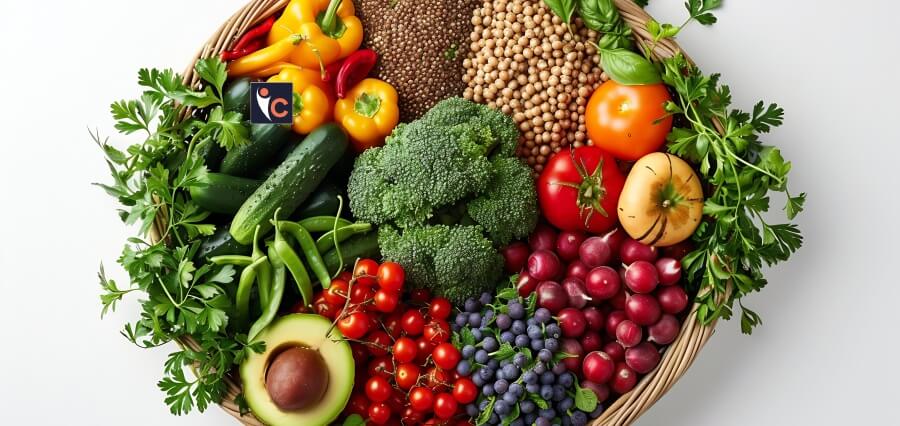Overview
Irritable Bowel Syndrome (IBS) is a common gastrointestinal (GI) condition, and it is presented as chronic symptoms, such as abdominal pain and cramps, bloating, and changes in bowel movements, like constipation, diarrhea, or both. These symptoms can impact the quality of life.
One crucial method to help manage symptoms of IBS symptoms is healthy food consumption; however, it can be challenging to know the right option. This article offers the best foods for managing irritable bowel syndrome to help control its symptoms. (1–6)
High-Fiber Foods
Foods rich in fiber, a plant-based nutrient, significantly improve the digestive system. Consuming foods rich in soluble fiber in proper amounts is recommended to help manage IBS symptoms. Soluble fibers are water-soluble foods digested by bacteria into by-products, such as short-chain fatty acids (SCFAs).
It is crucial to know that too little or too much amount of soluble fiber can worsen IBS symptoms.
Here are examples of soluble fiber foods:
– Oats:
Oats help improve bowel movement and reduce gases and bloating.
– Psyllium Husk:
Psyllium hush mixed with water helps support digestive health.
– Fruits:
Fruits such as berries and bananas are rich in soluble fibers and gentle on the GI tract.
– Vegetables:
Vegetables, such as carrots and pumpkins are also great sources of soluble fiber.
Probiotic-Rich Foods
Probiotics are live, beneficial microorganisms that help balance the gut microbiota. Studies have proven their positive impact on managing IBS symptoms via several suggested mechanisms, including:
- Suppressing the pathogenic bacteria growth by competing with nutrients and attachment sites.
- Improving the gut barrier.
- Enhancing digestion and nutrient absorption.
- Preventing inflammation, as probiotics have anti-inflammatory properties
Examples of Probiotic-Rich Foods
– Yogurt:
Yogurt is a great source of live culture that significantly improves digestive well-being.
– Kefir:
Kefir is a fermented milk rich in probiotics that enhance gut function.
– Kimchi:
Kimchi is a fermented vegetable that can be added to IBS-friendly food options.
– Miso and Tempeh:
Miso and Tempeh have fermented soy products that contain beneficial bacteria to support digestive health.
Hydration
Drinking adequate amounts of water every day can improve symptoms of irritable bowel syndrome by reducing the risk of constipation and enhancing bowel function. Herbal teas, such as ginger tea, can provide soothing effects and support digestion.
Low-FODMAP Diet
The Low-FODMAP diet is a strict diet, known for its effective role in controlling IBS symptoms.
FODMAP stands for “Fermentable Oligosaccharides, Disaccharides, Monosaccharides And Polyols. These are types of carbohydrates that are unabsorbed well in the small intestine, causing water retention and gas production, which worsen IBS symptoms, such as bloating, diarrhea, and pain. Following a low-FODMAP diet can reduce the risk of these symptoms.
Safe Options
– Vegetables:
Vegetables like zucchini, spinach, and carrots contain low amounts of FODMAPs, which help relieve symptoms of IBS.
– Fruits:
Citrus fruits, such as oranges and kiwis, as well as berries, are well-tolerated.
– Proteins:
Chicken, fish, turkey, and other lean meats are rich in proteins and contain no FODMAPs.
– Grains:
Gluten-free grains, such as rice and oats are IBS-friendly food options.
– Dairy Alternatives:
Almond and coconut milk and lactose-free dairy products are better options for enhanced gut health.
References
- https://www.verywellhealth.com/ibs-nutrition-4013556
- https://www.medicalnewstoday.com/articles/fiber-for-ibs#best-fiber
- https://www.ncbi.nlm.nih.gov/pmc/articles/PMC2886445/
- https://pubmed.ncbi.nlm.nih.gov/30452699/
- https://www.health.harvard.edu/diseases-and-conditions/a-new-diet-to-manage-irritable-bowel-syndrome
- https://www.eatingwell.com/best-foods-for-ibs-8400227










